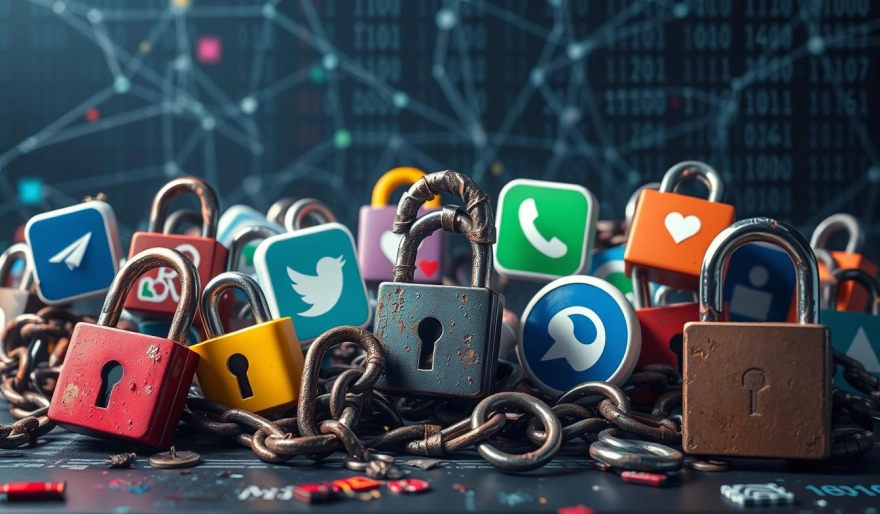Messaging Apps Differ Significantly in Encryption Standards
41 min read Discover how popular messaging apps differ in their security features and encryption methods. Compare Signal, WhatsApp, and Telegram to find the best messaging apps for your needs - written by Jay sanchez , Senior Content Marketer September 20, 2024 10:27
In today's digital world, keeping our communications safe is more important than ever. We use messaging apps to stay in touch, but it's key to know how secure they are. This article explores the encryption levels in popular messaging apps. It helps users choose the best for their privacy and safety.
Key Takeaways
- Messaging apps use different encryption methods, affecting how safe our messages are.
- Knowing how each app encrypts data is essential for picking a secure one.
- Some messaging apps offer better security than others, with stronger encryption.
- Encryption standards are vital for those who want to protect their private messages and data.
- Keeping up with the latest in messaging app security helps users make better choices and keep their digital lives safe.
Understanding Modern Encryption in Digital Communication
In today's digital world, encryption is key to secure communication. It protects our sensitive data and personal info from unwanted access. As we explore messaging apps, knowing the encryption methods is crucial for our privacy and data safety.
Types of Encryption Protocols
Encryption protocols are the tools that scramble our data. They turn readable info into unreadable code. Here are some common ones:
- AES (Advanced Encryption Standard): A widely used symmetric-key algorithm for data encryption.
- RSA (Rivest-Shamir-Adleman): An asymmetric-key encryption that uses public and private keys.
- ECC (Elliptic Curve Cryptography): A public-key system that encrypts efficiently with smaller keys.
Why Encryption Matters for Users
In today's world, encryption is vital for keeping our digital talks safe. It uses strong encryption protocols to protect our data protection. This is especially true for sensitive stuff like money talks, personal chats, and business secrets.
Basic Encryption Terminology
Knowing encryption basics helps us grasp its role in digital talks. Here are some key terms:
- Plaintext: The original, readable info that gets encrypted.
- Ciphertext: The encrypted, unreadable version of the info.
- Key: The code or algorithm for encrypting and decrypting data.
- Symmetric-key encryption: Uses the same key for both encrypting and decrypting.
- Asymmetric-key encryption: Uses two keys: a public one for encrypting and a private one for decrypting.
Understanding these encryption protocols and their role in data protection and cybersecurity helps us choose safer messaging apps. It also guides us in protecting our digital communications.
How End-to-End Encryption Works
In the world of secure messaging, end-to-end encryption (E2EE) is key. It keeps your data safe by making sure only the right people can see your messages. This makes your communications very secure.
The magic of E2EE starts with key exchange. When you send a message, your device makes a pair of keys. The public key goes to the recipient, and the private key stays with you. This way, only the right person can read your message, keeping it safe from others.
The E2EE process works as follows:
- You write a message on your device.
- Your device uses the recipient's public key to encrypt the message.
- The encrypted message is sent to the recipient's device.
- The recipient's device uses its private key to unlock the message.
This process makes sure your E2EE, secure messaging, and data privacy are safe. It keeps your important information away from unwanted eyes.
| Key Exchange Process | Encryption Mechanism | Security Benefits |
|---|---|---|
| Public and private key pair generation | Asymmetric encryption using recipient's public key | Ensures only intended recipient can decrypt the message |
"End-to-end encryption is the gold standard for secure messaging, ensuring that your data remains private and protected from unauthorized access."
Popular Messaging Apps Security Features Compared
Digital communication has made our conversations more private and secure. WhatsApp, Signal, and Telegram are top choices for messaging. They each offer different encryption and security features to keep user data safe. Let's explore how they compare.
WhatsApp Security Analysis
WhatsApp is the most used messaging app worldwide. It uses WhatsApp encryption to protect messages. This encryption, based on the Signal Protocol, ensures only the sender and receiver can see messages. Even if WhatsApp's servers are hacked, messages stay safe.
Signal's Protection Measures
Signal is known for its Signal security. It also uses the Signal Protocol but focuses more on privacy. Signal keeps very little user data and is open-source. This makes its security measures more transparent and open to review.
Telegram's Security Approach
Telegram has a unique way of handling Telegram privacy. It offers end-to-end encryption for "secret chats." But, its default mode uses a different encryption that some experts question. Telegram also keeps user data on its servers, which could be a risk for data breaches or government requests.
Choosing a messaging app depends on what you value most in security and privacy. If you want the strongest encryption and minimal data collection, Signal might be best. For others, WhatsApp or Telegram could be good choices, depending on their needs.
The Evolution of Messaging Apps Security Standards
Messaging app security has changed a lot over the years. This change shows how important privacy and encryption are today. As people worried more about keeping their messages safe, developers added better security features.
The story of chat app security started with simple encryption in the early days of the internet. But as technology got better and threats grew, so did the security of these apps. This is thanks to ongoing encryption history and privacy advancements.
One big step was the use of end-to-end encryption. This means only the person you're talking to can read your messages. Apps like Signal led the way, making many messaging apps more private and secure.
Also, adding biometric checks like fingerprints or facial scans has made apps safer. These checks make sure only you can get into your messages, adding an extra layer of protection.
As messaging apps keep getting better, developers are looking into new ways to keep messages safe. They're exploring things like quantum-resistant encryption and decentralized systems. This is to keep up with new threats and meet users' growing needs.
| Messaging App | Encryption Protocol | Privacy Features |
|---|---|---|
| Signal Protocol | End-to-end encryption, Disappearing messages | |
| Signal | Signal Protocol | End-to-end encryption, Disappearing messages, Sealed sender |
| Telegram | MTProto | Client-server encryption, Secret chats with end-to-end encryption |
As chat app security keeps getting better, we can look forward to even more safety and privacy features. These will help keep our digital conversations safe for years to come.
Vulnerabilities in Popular Chat Applications
Messaging apps are more popular than ever, but their security is a big worry. These apps are meant to make talking easy, but they often have weak spots. These spots can let hackers get to our personal info and privacy. It's important to know about these issues to stay safe online.
Common Security Weaknesses
Many messaging apps have security problems. These include bad encryption, wrong data storage, and easy targets for hackers. These issues let hackers read messages, get into accounts without permission, and mess with our privacy.
Historical Data Breaches
There have been big data breaches in messaging apps before. These breaches have shown millions of people's personal info. They remind us how important strong security is and how we must always be careful online.
User Privacy Concerns
People are worried about their data being used the wrong way. They're scared because they share a lot of personal info on these apps. This info can be used by others or even the app makers themselves.
| Messaging App | Known Vulnerabilities | Reported Data Breaches | Privacy Concerns |
|---|---|---|---|
| - Weak encryption implementation - Vulnerability to sticker-based attacks | - 2018 breach affecting 120 million users | - Data sharing with parent company Facebook - Concerns about government access to messages | |
| Signal | - Potential vulnerabilities in Signal Desktop - Concerns about metadata collection | - No major reported breaches | - Metadata collection and storage - Transparency concerns |
| Telegram | - Security flaws in secret chat feature - Vulnerabilities in cloud storage | - 2019 breach affecting 200 million users | - Lack of end-to-end encryption by default - Concerns about government access |
Knowing about these problems helps us choose safer messaging apps. We can protect our online privacy better. As messaging apps keep changing, it's key for both makers and users to focus on keeping our info safe.
Government Regulations and Encryption Policies
Governments around the world are trying to find a balance between encryption laws, government surveillance, and privacy legislation. With digital communication and data security so important, they aim to protect both national security and individual privacy.
Many countries have made rules that ask tech companies to give law enforcement access to encrypted data. They do this by creating "backdoors" in encryption. Supporters say this is needed to fight terrorism and organized crime. But critics worry it could harm data privacy and security.
The argument over encryption and surveillance has caused tension between tech giants and governments. In places like the United States and the United Kingdom, laws have been passed to make tech companies help with data decryption. On the other hand, countries like Germany and Switzerland focus more on protecting privacy.
| Country | Encryption Policy | Notable Regulations |
|---|---|---|
| United States | Supports limited government access to encrypted data | Communications Assistance for Law Enforcement Act (CALEA) |
| United Kingdom | Requires tech companies to assist with data decryption | Investigatory Powers Act |
| Germany | Protects strong encryption and user privacy | No mandatory backdoors or data decryption requirements |
| Switzerland | Favors user privacy and secure communication | No restrictions on end-to-end encryption |
The ongoing debate on encryption laws, government surveillance, and privacy legislation is complex. Policymakers and tech companies must find a way to balance national security with individual privacy.
Messaging Apps and Data Privacy Laws
In today's world, messaging is a big part of our lives. It's important for messaging apps to protect our personal info. They must follow strict data protection rules and meet global privacy standards.
GDPR Compliance Requirements
The General Data Protection Regulation (GDPR) is a key law for digital data. Messaging apps need to follow GDPR compliance to keep user data safe. They must get clear consent, share privacy policies, and use strong security to protect user info.
International Privacy Standards
Messaging apps also face rules from many places. They need to follow laws like HIPAA in the U.S. and PIPEDA in Canada. This helps them work worldwide while keeping user privacy safe.
"The right to privacy is a fundamental human right, and it is essential that messaging apps prioritize the protection of user data in an increasingly interconnected world."
It's tough for messaging apps to balance ease of use and data safety. But, they must do it to keep users' trust and follow changing privacy laws.
Best Practices for Secure Messaging
In today's digital world, keeping our messaging safe and private is key. We must use secure chat tips to protect our personal info and digital identity. These practices help us keep our messages safe and our privacy in control.
Enable Two-Factor Authentication
Two-factor authentication (2FA) is a top way to lock down your messaging accounts. It adds a second check, like a code to your phone, to keep hackers out. This makes your messages much safer.
Verify Encryption Keys
Many apps say they use end-to-end encryption to keep your chats safe. But, you should check the encryption keys with your contacts. This step, called key verification, makes sure your chats are really private.
Be Cautious with Sensitive Information
Even with secure apps, be careful with sensitive info. Don't share important stuff through messages. It's safer to talk in person or use encrypted files instead.
| Secure Chat Tips | Messaging Safety | Privacy Protection |
|---|---|---|
| Enable two-factor authentication | Verify encryption keys | Be cautious with sensitive information |
"In an age of digital communication, the security and privacy of our messaging conversations have become essential for maintaining trust and safeguarding our personal information."
Future Trends in Messaging Security
The world is getting more digital, making secure messaging crucial. Luckily, messaging security is set to improve a lot. This is thanks to quantum encryption and new security tech.
Quantum Encryption Development
Quantum encryption is a big deal in messaging security. It uses quantum mechanics to create a code that's hard to break. Quantum encryption will change the future of messaging by offering top-notch advanced security.
Emerging Security Technologies
New security tech is coming too. This includes better biometric authentication, blockchain messaging, and AI threat detection. These emerging security technologies will make messaging even safer.
The future of messaging security looks bright. Quantum encryption and new tech will change how we talk online. Soon, our digital chats will be much safer.
Impact of Encryption on User Experience
Encryption is key to keeping digital communications safe. Developers of messaging apps must balance strong security with an easy-to-use interface. Encryption usability is now a major focus, as users want both privacy and ease of use.
The balance between privacy vs. convenience is tricky. Apps with strong encryption protect data well but can be hard to learn. On the other hand, apps that are easy to use might not offer as much privacy. It's important to find a middle ground to keep users happy and secure.
Developers are working hard to make encrypted apps easy to use. They're making setup simple, managing keys smoothly, and sending out security alerts. This way, users can stay safe online without feeling overwhelmed. As more people seek private messaging, apps that are both secure and user-friendly will stand out.
FAQ
What is the importance of encryption in messaging apps?
Encryption is key in messaging apps to keep your chats private and safe. It makes sure only the person you're talking to can see what you're saying. This keeps your messages safe from unwanted eyes.
How does end-to-end encryption (E2EE) work?
End-to-end encryption makes sure messages are locked on your phone. They can only be unlocked by the person you're sending them to. This means no one, not even the app itself, can read your messages.
What are the key security features of popular messaging apps like WhatsApp, Signal, and Telegram?
WhatsApp uses the Signal protocol for top-notch encryption. Signal is all about strong security and keeping your info private. Telegram has client-side encryption but its security has been questioned by some experts.
What are some common vulnerabilities in messaging apps?
Messaging apps can face security issues like data leaks and privacy concerns. Past breaches, weak encryption, and government spying have made people worry about their safety online.
How do data privacy laws and regulations impact messaging apps?
Messaging apps must follow data privacy laws like GDPR. This means they have to handle your data right, get your consent, and be open about their privacy practices.
What are some best practices for using messaging apps securely?
To keep your chats safe, turn on two-factor authentication and check encryption keys. Be careful with sensitive info and know the security and privacy of the apps you use.
How will emerging technologies like quantum encryption impact the future of messaging security?
Quantum encryption could change how messaging apps keep your chats safe. It might offer even better security against threats from quantum computers.
How do encryption and security features affect the user experience in messaging apps?
It's hard for app makers to balance strong security with easy use. They need to make encryption work without making the app hard to use.
User Comments (0)
Popular Apps










Editor's Choice









